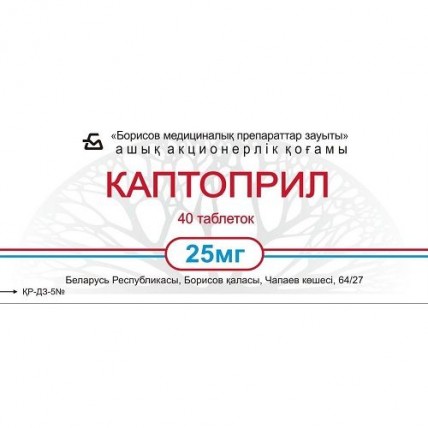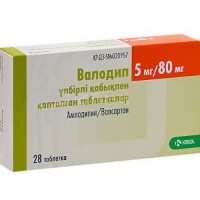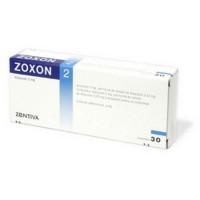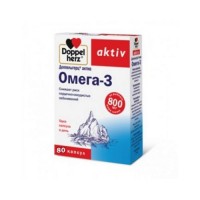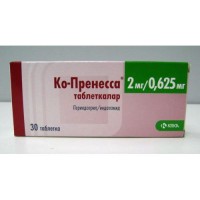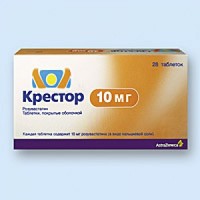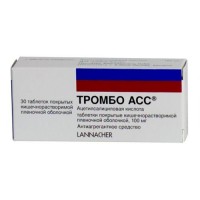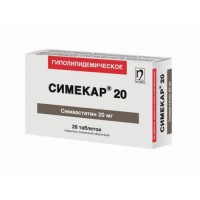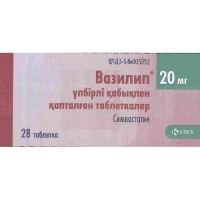The instruction for medical use
of medicine
Captopril
the Trade name
Captopril
the International unlicensed
name Captopril Dosage Form
of the Tablet of 25 mg
Structure
One tablet contains
active agent – captopril of 25 mg,
excipients – lactoses monohydrate, cellulose microcrystalline, starch corn, stearic acid.
The description
of the Tablet of a ploskotsilindrichesky form, white or almost white color, with a facet, with a characteristic smell.
Pharmacotherapeutic group
the Drugs influencing systems renin-angiotensin. Angiotensin of the converting enzyme inhibitors (AKF). Captopril.
The ATX C09AA01 code
the Pharmacological
Pharmacokinetics Absorption Later properties of intake not less than 75% of the accepted dose quickly is soaked up from digestive tract. Cmax in blood plasma is reached in 1 h. The concomitant use of food slows down absorption of drug for 30 – 40%.
Passes through gistogematichesky barriers, excepting a blood-brain barrier, through a placenta and gets into breast milk. It is metabolized in a liver, approximately for 50% in inaktivny disulfides (captopril disulfide and a captopril-cysteine-disulfide).
Distribution
Linking with blood proteins makes 25 – 30%.
Removal
of T1/2 makes less than 3 h. More than 95% of drug are removed with urine, 40 - 50% in not changed look, the rest - in the form of metabolites.
The pharmacokinetics in special clinical cases
of T1/2 increases in a renal failure.
A pharmacodynamics
the Competitive inhibitor of angiotensin-converting enzyme – the enzyme promoting transformation of angiotensin I into angiotensin II.
Medicine has antihypertensive effect, reduces the general peripheric vascular resistance (afterload), preloading and resistance in pulmonary vessels, increases the minute volume of heart and tolerance to physical activity.
At prolonged use reduces expressiveness of a hypertrophy of a myocardium of a left ventricle, prevents progressing of heart failure and slows down development of dilatation of a left ventricle.
Indications
– arterial hypertension (in the form of monotherapy and in a combination with other antihypertensive medicines, for example, with thiazide diuretics)
– chronic heart failure (as a part of combination therapy)
– coronary heart disease (dysfunction of a left ventricle after the postponed myocardial infarction at patients in a stable clinical state)
– a diabetic nephropathy (a microalbuminuria more than 30 mg/days) in insulin-dependent diabetes mellitus.
The initial dose makes a route of administration and doses In slight and moderate arterial hypertension on 12.5 mg of 2 times/days. If necessary the dose is increased by each 2 - 4 weeks. The average therapeutic dose makes 50 mg of 2 times/days. The maintenance dose makes 25 mg of 2 times/days.
In heavy arterial hypertension the initial dose makes 12.5 mg of 2 times/days. A dose gradually increase to the maximum daily dose 150 mg (on 50 mg of 3 times/days). At use of captopril as a part of the combined antihypertensive therapy the dose it should be selected individually.
In heart failure the initial dose makes 6.25 mg of 3 times/days. If necessary the dose is increased by each 2 weeks. A maintenance dose - on 25 mg of 2 - 3 times/days. The maximum daily dose – 150 mg.
In coronary heart disease the treatment can be begun in 3 days after the postponed myocardial infarction. The initial dose makes 6.25 mg of 3 times/days with gradual increase (within several weeks) up to 75 mg/days (on 25 mg of 3 times/days). If necessary the dose is gradually increased to the maximum daily – 150 mg (on 50 mg of 3 times/days). Captopril can be applied as a part of combination therapy of a myocardial infarction (together with trombolitika, acetylsalicylic acid and beta blockers).
At a diabetic nephropathy the daily dose makes from 75 mg to 100 mg divided into 2 - 3 receptions.
To patients with a renal failure of easy or moderate degree (clearance of creatinine not less than 30 ml/min. / 1.73 sq.m) captopril is appointed in the daily dose 75 - 100 mg divided into 2 - 3 receptions. In heavy renal failures (clearance of creatinine less than 30 ml/min. / 1.73 sq.m) the initial dose makes no more than 12.5 mg of 2 times/days. At insufficient efficiency the dose is gradually increased by each 1 - 2 weeks before therapeutic effect, but the maximum daily dose of drug has to be the interval between administrations of drug is reduced or is increased.
In need of purpose of the accompanying therapy by diuretics to patients with a heavy renal failure, preference is given to loopback diuretics (furosemide).
To patients of advanced age the dose is selected individually. Treatment is recommended to be begun with the smallest therapeutic dose and to support at the level of the smallest effective dose.
Side effects
Often
- dizziness, sleep disorders
- dryness in a mouth, disturbance of flavoring feelings (the metal or
salty smack independently disappearing in 2-3 months after
an initiation of treatment), nausea, vomiting, an abdominal pain, diarrhea, a constipation
- a hyponatremia
- dry cough
- skin rash, an itching
Infrequently
- tachycardia, heartbeat, stethalgias
- arterial hypotension
- feeling of fatigue, an asthenia
Seldom
- anorexia
- increase in content in blood serum of creatinine, residual nitrogen
of urea
- a renal failure, a polyuria, an oliguria, a proteinuria, the speeded-up
urination
- a headache, drowsiness, paresthesias
- stomatitis, aphthous ulcers of a mucous membrane of a mouth
Very seldom
- a nephrotic syndrome
- a neutropenia, an agranulocytosis, a pancytopenia, anemia, thrombocytopenia,
an eosinophilia, a positive caption of antinuclear antibodies, increase
in SOE
- a hyperpotassemia, a hypoglycemia
- a bronchospasm, rhinitis, an allergic alveolitis / eosinophilic pneumonia
- a glossitis, stomach ulcer, pancreatitis
- an abnormal liver function, a cholestasia, jaundice, hepatitis, necrosis of hepatic
cells, increase in level of hepatic transaminases, bilirubin
- a Quincke's disease, Stephens-Johnson's syndrome, a multiformny
erythema, a photosensitization, exfoliative dermatitis
- myalgias, arthralgias
- impotence,
the Contraindication gynecomastia
- hypersensitivity to captopril, any other component of drug or other APF inhibitor
- the Quincke's disease in the anamnesis associated with the previous therapy by APF inhibitor
- a hereditary / idiopathic Quincke's disease
– the profound renal failures, a liver
– a hyperpotassemia
– a bilateral stenosis of renal arteries or a stenosis of an artery of the only kidney with the progressing azotemia
- primary hyper aldosteronism
- a leukopenia, thrombocytopenia
– a state after transplantation of a kidney
– the stenosis of the mouth of an aorta and similar obstructive changes complicating outflow of blood from a left ventricle
– pregnancy
– the lactation period
- children's and teenage age up to 18 years
- the desensibilizing therapy against poisons of insects (life-threatening anaphylactoid reactions - falling of arterial blood pressure, suffocation, vomiting, allergic skin reactions)
- dialysis with use polyacrylonitrile-methallyl-sulfonatnykh of membranes with high-permeability (for example, AN 69 can develop) because of danger of development of anaphylactoid reactions (reaction of hypersensitivity), up to shock.
Medicinal interactions
Diuretics, vazodilatator, ganglioblokator, adrenoblockers at simultaneous use strengthen antihypertensive effect of captopril.
Indometacin and other non-steroidal anti-inflammatory drugs and also a clonidine can reduce antihypertensive effect of captopril.
Against the background of simultaneous use of captopril with Allopyrinolum and procaineamide the neutropenia and/or Stephens-Johnson's syndrome can be observed, however relationship of cause and effect of these phenomena is not clear.
At simultaneous use with captopril of immunodepressants (for example, Azathioprinum and cyclophosphamide) risk of development of hematologic disturbances increases.
Simultaneous use of some anesthetics, tricyclic antidepressants and antipsychotic drugs with APF inhibitors enhances hypotensive effect. Therefore, it is necessary to avoid use of such combination.
Against the background of captopril the concentration of digoxin in plasma increases.
Nitroglycerine mutually enhances hypotensive and anti-anginal effects.
Orlistat promotes reduction of efficiency of captopril that can lead to increase in the ABP, hypertensive crisis, the case of a cerebral hemorrhage is described.
Combined use with interleukin-3, minoksidily, Sodium nitroprussidum, pergolidy promotes strengthening of antihypertensive effect.
At use with interferon alpha 2а, interferon a beta development of a heavy granulocytopenia is possible.
Against the background of simultaneous use of a probenetsid the removal of captopril with urine decreases.
Simultaneous use of salts of lithium and captopril can lead to increase in concentration of lithium in blood serum. At the same time the risk of emergence of side and toxic effects of drugs of lithium increases.
At use of loopback or thiazide diuretics with Captopril the risk of developing the profound hypotension, especially after the first dose of diuretic, a hypopotassemia, renal failures increases. The previous treatment by thiazide or loopback diuretics in high doses before therapy by Captopril causes decrease in volume of the circulating blood and increases risk of developing hypotension.
Combined use with antacids (aluminum hydroxide, magnesium hydroxide, simetikon) reduces captopril absorption thereof they need to be accepted separately with a period of time not less than 2 hours.
Ethanol strengthens hypotension therefore for the period of treatment it is necessary to refuse consumption of alcoholic beverages.
Special instructions
With care it is necessary to appoint captopril at collagenoses in view of increase in risk of emergence of a neutropenia and an agranulocytosis, at simultaneous system therapy the medicines suppressing defense reactions (for example, kortikoida, cytostatics, antimetabolites), Allopyrinolum, procaineamide or lithium.
When prescribing captopril with the significant disturbances of water and electrolytic balance it is necessary to carry out correction of this state. During treatment, captopril does not recommend to take kaliysberegayushchy diuretics or the drugs of potassium, especially to patients with the profound renal failures.
The Quincke's disease of extremities, persons, lips, mucous membranes, language, a throat or a throat is observed at patients at use of inhibitors of angiotensin-converting enzyme, including captopril. If puffiness is limited to a face and lips, such state usually passes after medicine phase-out. For simplification of clinical symptoms antihistaminic drugs can be used. Patients have to be under observation of the doctor before disappearance of symptoms. If hypostasis covers language, a throat or a throat with threat of development of obstruction of airways, it is necessary to enter subcutaneously 0.5 ml of 0.1% of solution of adrenaline.
During treatment, captopril showed observance of a diet with the low content of sodium.
Captopril can cause false positive reaction in the analysis of urine to acetone.
Use in pediatrics
Safety and efficiency of use of drug for children are not studied.
The period of pregnancy and a lactation
Captopril is not recommended to be applied during pregnancy and in the period of a lactation. When planning or the confirmed pregnancy it is necessary to pass to alternative treatment. At use of APF inhibitors in the second and third trimesters of pregnancy the manifestation of fetotoksichesky action (a renal failure, oligogidramnioz, a delay of ossification of bones of a skull) and neonatal toxicity (renal failure, hypotension, a hyperpotassemia) is established.
By limited pharmacokinetic data it was shown that captopril creates low concentration in breast milk. Though the created concentration can be considered as clinically insignificant, use of this medicine during feeding by a breast is not recommended in case of the birth of premature newborns and also in the first several weeks after the birth in connection with expected risk of an adverse effect on a cardiovascular system and kidneys and also insufficient clinical experience.
The feature of influence of medicine on ability to run the vehicle or potentially dangerous mechanisms
during treatment needs to abstain from driving of motor transport and occupations potentially dangerous types of activity demanding the increased concentration of attention and speed of psychomotor reactions since dizziness, especially after reception of an initial dose is possible.
Overdose
Symptoms: it is shown by the profound hypotension, with possible development of a myocardial infarction, acute disorder of cerebral circulation and tromboembolic episodes against the background of a sharp lowering of arterial pressure.
Treatment: the patient should accept horizontal position (legs have to be raised) and to enter to it intravenously isotonic solution of sodium of chloride or other plasma substituting liquids for correction of the volume of the circulating blood (VCB), symptomatic treatment. Specific antidote does not exist. Captopril is removed at a hemodialysis.
A form of release and packing
On 10 tablets in blister strip packaging from a film of polyvinylchloride and aluminum foil.
On the 4th blister strip packagings together with the instruction for medical use in the state and Russian languages in a pack from cardboard.
Storage conditions
In the dry, protected from light place, at a temperature not above 25 °C.
To protect from children!
4 years
not to use a period of storage after expiry date.
Prescription status
According to the prescription
the Borisovsky Plant of Medications Open joint stock company Producer, Republic of Belarus, Minsk Region, Borisov, Chapayev St., 64/27,
ph. / fax 8-(10375177) 744280.
The owner of the registration certificate
Borisovsky Plant of Medications Open joint stock company, Republic of Belarus
to Develop the Address of the organization accepting in the territory of the Republic of Kazakhstan claims from consumers on quality of products (goods) Borisovsky Plant of Medications Open joint stock company, Republic of Belarus, Minsk Region, Borisov, Chapayev St., 64/27, ph. / fax 8-(10375177) 744280, the e-mail address of market@borimed.com
of medicine
Captopril
the Trade name
Captopril
the International unlicensed
name Captopril Dosage Form
of the Tablet of 25 mg
Structure
One tablet contains
active agent – captopril of 25 mg,
excipients – lactoses monohydrate, cellulose microcrystalline, starch corn, stearic acid.
The description
of the Tablet of a ploskotsilindrichesky form, white or almost white color, with a facet, with a characteristic smell.
Pharmacotherapeutic group
the Drugs influencing systems renin-angiotensin. Angiotensin of the converting enzyme inhibitors (AKF). Captopril.
The ATX C09AA01 code
the Pharmacological
Pharmacokinetics Absorption Later properties of intake not less than 75% of the accepted dose quickly is soaked up from digestive tract. Cmax in blood plasma is reached in 1 h. The concomitant use of food slows down absorption of drug for 30 – 40%.
Passes through gistogematichesky barriers, excepting a blood-brain barrier, through a placenta and gets into breast milk. It is metabolized in a liver, approximately for 50% in inaktivny disulfides (captopril disulfide and a captopril-cysteine-disulfide).
Distribution
Linking with blood proteins makes 25 – 30%.
Removal
of T1/2 makes less than 3 h. More than 95% of drug are removed with urine, 40 - 50% in not changed look, the rest - in the form of metabolites.
The pharmacokinetics in special clinical cases
of T1/2 increases in a renal failure.
A pharmacodynamics
the Competitive inhibitor of angiotensin-converting enzyme – the enzyme promoting transformation of angiotensin I into angiotensin II.
Medicine has antihypertensive effect, reduces the general peripheric vascular resistance (afterload), preloading and resistance in pulmonary vessels, increases the minute volume of heart and tolerance to physical activity.
At prolonged use reduces expressiveness of a hypertrophy of a myocardium of a left ventricle, prevents progressing of heart failure and slows down development of dilatation of a left ventricle.
Indications
– arterial hypertension (in the form of monotherapy and in a combination with other antihypertensive medicines, for example, with thiazide diuretics)
– chronic heart failure (as a part of combination therapy)
– coronary heart disease (dysfunction of a left ventricle after the postponed myocardial infarction at patients in a stable clinical state)
– a diabetic nephropathy (a microalbuminuria more than 30 mg/days) in insulin-dependent diabetes mellitus.
The initial dose makes a route of administration and doses In slight and moderate arterial hypertension on 12.5 mg of 2 times/days. If necessary the dose is increased by each 2 - 4 weeks. The average therapeutic dose makes 50 mg of 2 times/days. The maintenance dose makes 25 mg of 2 times/days.
In heavy arterial hypertension the initial dose makes 12.5 mg of 2 times/days. A dose gradually increase to the maximum daily dose 150 mg (on 50 mg of 3 times/days). At use of captopril as a part of the combined antihypertensive therapy the dose it should be selected individually.
In heart failure the initial dose makes 6.25 mg of 3 times/days. If necessary the dose is increased by each 2 weeks. A maintenance dose - on 25 mg of 2 - 3 times/days. The maximum daily dose – 150 mg.
In coronary heart disease the treatment can be begun in 3 days after the postponed myocardial infarction. The initial dose makes 6.25 mg of 3 times/days with gradual increase (within several weeks) up to 75 mg/days (on 25 mg of 3 times/days). If necessary the dose is gradually increased to the maximum daily – 150 mg (on 50 mg of 3 times/days). Captopril can be applied as a part of combination therapy of a myocardial infarction (together with trombolitika, acetylsalicylic acid and beta blockers).
At a diabetic nephropathy the daily dose makes from 75 mg to 100 mg divided into 2 - 3 receptions.
To patients with a renal failure of easy or moderate degree (clearance of creatinine not less than 30 ml/min. / 1.73 sq.m) captopril is appointed in the daily dose 75 - 100 mg divided into 2 - 3 receptions. In heavy renal failures (clearance of creatinine less than 30 ml/min. / 1.73 sq.m) the initial dose makes no more than 12.5 mg of 2 times/days. At insufficient efficiency the dose is gradually increased by each 1 - 2 weeks before therapeutic effect, but the maximum daily dose of drug has to be the interval between administrations of drug is reduced or is increased.
In need of purpose of the accompanying therapy by diuretics to patients with a heavy renal failure, preference is given to loopback diuretics (furosemide).
To patients of advanced age the dose is selected individually. Treatment is recommended to be begun with the smallest therapeutic dose and to support at the level of the smallest effective dose.
Side effects
Often
- dizziness, sleep disorders
- dryness in a mouth, disturbance of flavoring feelings (the metal or
salty smack independently disappearing in 2-3 months after
an initiation of treatment), nausea, vomiting, an abdominal pain, diarrhea, a constipation
- a hyponatremia
- dry cough
- skin rash, an itching
Infrequently
- tachycardia, heartbeat, stethalgias
- arterial hypotension
- feeling of fatigue, an asthenia
Seldom
- anorexia
- increase in content in blood serum of creatinine, residual nitrogen
of urea
- a renal failure, a polyuria, an oliguria, a proteinuria, the speeded-up
urination
- a headache, drowsiness, paresthesias
- stomatitis, aphthous ulcers of a mucous membrane of a mouth
Very seldom
- a nephrotic syndrome
- a neutropenia, an agranulocytosis, a pancytopenia, anemia, thrombocytopenia,
an eosinophilia, a positive caption of antinuclear antibodies, increase
in SOE
- a hyperpotassemia, a hypoglycemia
- a bronchospasm, rhinitis, an allergic alveolitis / eosinophilic pneumonia
- a glossitis, stomach ulcer, pancreatitis
- an abnormal liver function, a cholestasia, jaundice, hepatitis, necrosis of hepatic
cells, increase in level of hepatic transaminases, bilirubin
- a Quincke's disease, Stephens-Johnson's syndrome, a multiformny
erythema, a photosensitization, exfoliative dermatitis
- myalgias, arthralgias
- impotence,
the Contraindication gynecomastia
- hypersensitivity to captopril, any other component of drug or other APF inhibitor
- the Quincke's disease in the anamnesis associated with the previous therapy by APF inhibitor
- a hereditary / idiopathic Quincke's disease
– the profound renal failures, a liver
– a hyperpotassemia
– a bilateral stenosis of renal arteries or a stenosis of an artery of the only kidney with the progressing azotemia
- primary hyper aldosteronism
- a leukopenia, thrombocytopenia
– a state after transplantation of a kidney
– the stenosis of the mouth of an aorta and similar obstructive changes complicating outflow of blood from a left ventricle
– pregnancy
– the lactation period
- children's and teenage age up to 18 years
- the desensibilizing therapy against poisons of insects (life-threatening anaphylactoid reactions - falling of arterial blood pressure, suffocation, vomiting, allergic skin reactions)
- dialysis with use polyacrylonitrile-methallyl-sulfonatnykh of membranes with high-permeability (for example, AN 69 can develop) because of danger of development of anaphylactoid reactions (reaction of hypersensitivity), up to shock.
Medicinal interactions
Diuretics, vazodilatator, ganglioblokator, adrenoblockers at simultaneous use strengthen antihypertensive effect of captopril.
Indometacin and other non-steroidal anti-inflammatory drugs and also a clonidine can reduce antihypertensive effect of captopril.
Against the background of simultaneous use of captopril with Allopyrinolum and procaineamide the neutropenia and/or Stephens-Johnson's syndrome can be observed, however relationship of cause and effect of these phenomena is not clear.
At simultaneous use with captopril of immunodepressants (for example, Azathioprinum and cyclophosphamide) risk of development of hematologic disturbances increases.
Simultaneous use of some anesthetics, tricyclic antidepressants and antipsychotic drugs with APF inhibitors enhances hypotensive effect. Therefore, it is necessary to avoid use of such combination.
Against the background of captopril the concentration of digoxin in plasma increases.
Nitroglycerine mutually enhances hypotensive and anti-anginal effects.
Orlistat promotes reduction of efficiency of captopril that can lead to increase in the ABP, hypertensive crisis, the case of a cerebral hemorrhage is described.
Combined use with interleukin-3, minoksidily, Sodium nitroprussidum, pergolidy promotes strengthening of antihypertensive effect.
At use with interferon alpha 2а, interferon a beta development of a heavy granulocytopenia is possible.
Against the background of simultaneous use of a probenetsid the removal of captopril with urine decreases.
Simultaneous use of salts of lithium and captopril can lead to increase in concentration of lithium in blood serum. At the same time the risk of emergence of side and toxic effects of drugs of lithium increases.
At use of loopback or thiazide diuretics with Captopril the risk of developing the profound hypotension, especially after the first dose of diuretic, a hypopotassemia, renal failures increases. The previous treatment by thiazide or loopback diuretics in high doses before therapy by Captopril causes decrease in volume of the circulating blood and increases risk of developing hypotension.
Combined use with antacids (aluminum hydroxide, magnesium hydroxide, simetikon) reduces captopril absorption thereof they need to be accepted separately with a period of time not less than 2 hours.
Ethanol strengthens hypotension therefore for the period of treatment it is necessary to refuse consumption of alcoholic beverages.
Special instructions
With care it is necessary to appoint captopril at collagenoses in view of increase in risk of emergence of a neutropenia and an agranulocytosis, at simultaneous system therapy the medicines suppressing defense reactions (for example, kortikoida, cytostatics, antimetabolites), Allopyrinolum, procaineamide or lithium.
When prescribing captopril with the significant disturbances of water and electrolytic balance it is necessary to carry out correction of this state. During treatment, captopril does not recommend to take kaliysberegayushchy diuretics or the drugs of potassium, especially to patients with the profound renal failures.
The Quincke's disease of extremities, persons, lips, mucous membranes, language, a throat or a throat is observed at patients at use of inhibitors of angiotensin-converting enzyme, including captopril. If puffiness is limited to a face and lips, such state usually passes after medicine phase-out. For simplification of clinical symptoms antihistaminic drugs can be used. Patients have to be under observation of the doctor before disappearance of symptoms. If hypostasis covers language, a throat or a throat with threat of development of obstruction of airways, it is necessary to enter subcutaneously 0.5 ml of 0.1% of solution of adrenaline.
During treatment, captopril showed observance of a diet with the low content of sodium.
Captopril can cause false positive reaction in the analysis of urine to acetone.
Use in pediatrics
Safety and efficiency of use of drug for children are not studied.
The period of pregnancy and a lactation
Captopril is not recommended to be applied during pregnancy and in the period of a lactation. When planning or the confirmed pregnancy it is necessary to pass to alternative treatment. At use of APF inhibitors in the second and third trimesters of pregnancy the manifestation of fetotoksichesky action (a renal failure, oligogidramnioz, a delay of ossification of bones of a skull) and neonatal toxicity (renal failure, hypotension, a hyperpotassemia) is established.
By limited pharmacokinetic data it was shown that captopril creates low concentration in breast milk. Though the created concentration can be considered as clinically insignificant, use of this medicine during feeding by a breast is not recommended in case of the birth of premature newborns and also in the first several weeks after the birth in connection with expected risk of an adverse effect on a cardiovascular system and kidneys and also insufficient clinical experience.
The feature of influence of medicine on ability to run the vehicle or potentially dangerous mechanisms
during treatment needs to abstain from driving of motor transport and occupations potentially dangerous types of activity demanding the increased concentration of attention and speed of psychomotor reactions since dizziness, especially after reception of an initial dose is possible.
Overdose
Symptoms: it is shown by the profound hypotension, with possible development of a myocardial infarction, acute disorder of cerebral circulation and tromboembolic episodes against the background of a sharp lowering of arterial pressure.
Treatment: the patient should accept horizontal position (legs have to be raised) and to enter to it intravenously isotonic solution of sodium of chloride or other plasma substituting liquids for correction of the volume of the circulating blood (VCB), symptomatic treatment. Specific antidote does not exist. Captopril is removed at a hemodialysis.
A form of release and packing
On 10 tablets in blister strip packaging from a film of polyvinylchloride and aluminum foil.
On the 4th blister strip packagings together with the instruction for medical use in the state and Russian languages in a pack from cardboard.
Storage conditions
In the dry, protected from light place, at a temperature not above 25 °C.
To protect from children!
4 years
not to use a period of storage after expiry date.
Prescription status
According to the prescription
the Borisovsky Plant of Medications Open joint stock company Producer, Republic of Belarus, Minsk Region, Borisov, Chapayev St., 64/27,
ph. / fax 8-(10375177) 744280.
The owner of the registration certificate
Borisovsky Plant of Medications Open joint stock company, Republic of Belarus
to Develop the Address of the organization accepting in the territory of the Republic of Kazakhstan claims from consumers on quality of products (goods) Borisovsky Plant of Medications Open joint stock company, Republic of Belarus, Minsk Region, Borisov, Chapayev St., 64/27, ph. / fax 8-(10375177) 744280, the e-mail address of market@borimed.com
